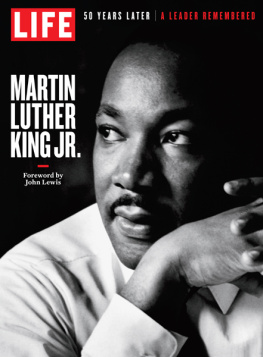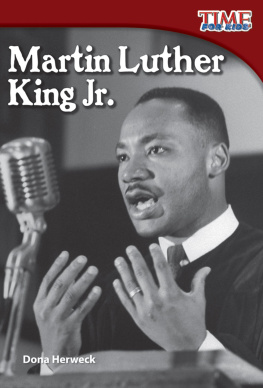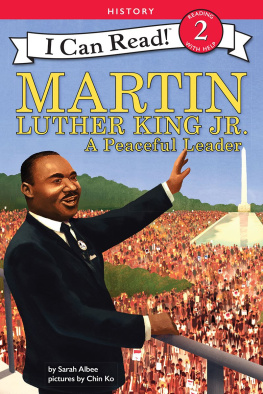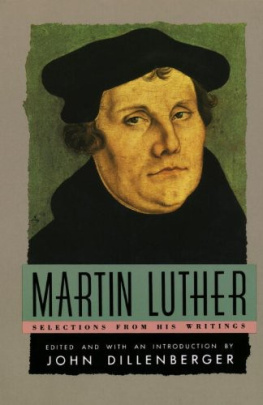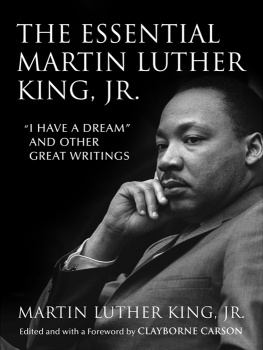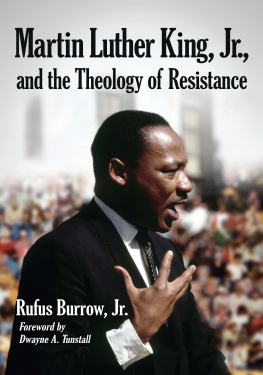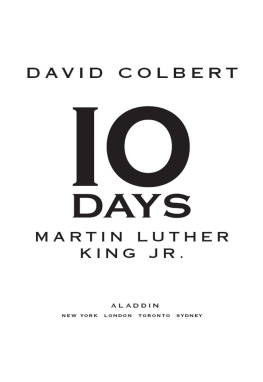TO SHAPE A NEW WORLD
Essays on the Political Philosophy of
MARTIN LUTHER KING, JR.
EDITED BY TOMMIE SHELBY AND BRANDON M. TERRY
THE BELKNAP PRESS OF HARVARD UNIVERSITY PRESS
Cambridge, Massachusetts
London, England
2018
Copyright 2018 by the President and Fellows of Harvard College
All rights reserved
Jacket design: Graciela Galup
Jacket photo: Reg Lancaster/Getty Images
978-0-674-98075-4 (alk. paper)
978-0-674-91984-6 (EPUB)
978-0-674-91985-3 (MOBI)
978-0-674-91986-0 (PDF)
The Library of Congress has cataloged the printed edition as follows:
Names: Shelby, Tommie, 1967 editor. | Terry, Brandon M., editor.
Title: To shape a new world : essays on the political philosophy of Martin Luther King, Jr. / edited by Tommie Shelby and Brandon M. Terry.
Description: Cambridge, Massachusetts : The Belknap Press of Harvard University Press, 2018. | Includes bibliographical references and index.
Identifiers: LCCN 2017034194
Subjects: LCSH: King, Martin Luther, Jr., 19291968KnowledgePolitical science. | King, Martin Luther, Jr., 19291968Influence. | Political scienceUnited StatesPhilosophy. | RacismUnited StatesPhilosophy.
Classification: LCC E185.97.K5 T6 2018 | DDC 323.092dc23 LC record available at https://lccn.loc.gov/2017034194
For Ayana, Christopher, and Ella
But we do not have much time. The revolutionary spirit is already world-wide. If the anger of the peoples of the world at the injustice of things is to be channeled into a revolution of love and creativity, we must begin now to work, urgently, with all the peoples, to shape a new world.
MARTIN LUTHER KING, JR., The Trumpet of Conscience
Contents
- BRANDON M. TERRY AND TOMMIE SHELBY
- ROBERT GOODING-WILLIAMS
- PAUL C. TAYLOR
- BERNARD R. BOXILL
- KARUNA MANTENA
- MARTHA C. NUSSBAUM
- RONALD R. SUNDSTROM
- DANIELLE ALLEN
- DERRICK DARBY
- TOMMIE SHELBY
- SHATEMA THREADCRAFT AND BRANDON M. TERRY
- LAWRIE BALFOUR
- LIONEL K. MPHERSON
- MICHELE MOODY-ADAMS
- BRANDON M. TERRY
- CORNEL WEST
- JONATHAN L. WALTON
BRANDON M. TERRY AND TOMMIE SHELBY
The fiftieth anniversary of the assassination of Martin Luther King, Jr., on April 4, 1968, will undoubtedly occasion many observances of his extraordinary life and enduring political legacy. This response is only befitting of Kings profound sacrifices, as well as the sacrifices of those But even as we honor Kings memory, it is imperative that we consider what his thought still has to teach us about how to build a more just and peaceful world and, more generally, about political morality, judgment, and practice.
Any attempt to interpret and critically engage Kings political
But despite Kings having been memorialized so widely and quoted so frequently, serious study and criticism
These dual phenomena of ritual celebration and intellectual marginalization are, we believe, connected, and their entanglement presents both an immediate obstacle and a significant risk to any scholarly venture that aims to examine Kings political and philosophical arguments with rigor, clarity, and intellectual integrity. Such efforts must avoid crashing upon the shoals of the dominant narrative of the civil rights era, which portrays the movement only as a moment of intensive activism, legal struggle, and moral suasion focused on extending the existing rights and opportunities promised in Americas founding documents to those African Americans living under the shadow of Jim Crow in the South.
This master narrative
In the domain of the civil rights movement, romantic narratives tend to organize the timeframe, geographic focus, and leading characters of civil rights history around
From this vantage, what appears most innovative and valuable about the civil rights movement and the intellectual contributions of leaders like King is essentially tactical and rhetorical. This way of thinking trains our imagination and judgment to focus on those moments where the words of civil rights activists seem to most forcefully rearticulate a deep political consensus at the heart of American public culture while dramatizing how racial exclusions violate these commitments.
Indeed, despite the current proliferation of interdisciplinary studies of African American political thought by a handful of scholars, many political philosophers cleave to an old idea advanced by the Swedish social scientist Gunnar Myrdal
In light of this inheritance and its operative narratives, we should not be surprised to find that King is uniquely vulnerable to having the richness and complexity of his thought ignored. His contributions, once shunted into this truncated realm of rhetoric and protest meant to unmask racial hypocrisy, seem ill-fitted for the disciplinary For these critics, King is easier to imagine as an obstacle than as a resource for critical thinking about injustice in our moment.
To paraphrase Wittgenstein, one might say that when it comes to King, contemporary political theory, philosophy, and social criticism are held captive by a picture. It is difficult to get outside that picture because it lies deep within our cultural common sense. The very vocabularies, narratives, concepts, and paradigms we have developed, ostensibly to understand someone like King, inexorably repeat back to us an image that conceals the scope and subtlety of his thought. The part of Kings thinking that remains visible gets compressed into arguments or claims that, for most political philosophers, are already considered convictions. Thus, reading Martin Luther King seriously appears incapable of repaying the effort. As scholars of black political thought and African American philosophy, we find these interpretive obstacles, perhaps particularly acute in this case, to be familiar. We hope to demonstrate the wrongheadedness of this larger orientation while also presenting a valuable collection of original theoretical work on a historically significant but deeply underappreciated thinker.
Though he held a doctorate in systematic theology and spent a number of years studying the history of Western political thought and philosophy, King
It is also important to acknowledge that King is often read through one of the most enduring and entrenched features of black political culture: the celebration of, and reverence for, virtuosic oratory performance and oracular wisdom. range of audiences. These talents understandably continue to play a significant role in securing and shaping Kings legacy.
Although poetic and prophetic performance can indeed impart vital philosophical insight, interpreting a public philosopher like King solely through this lens risks distortion and invites misuse. For instance, one can be tempted to invoke a phrase, abstracted from its context,
This vision, more broadly, calls for analyses of black political thought that attend carefully to the details and nuances of arguments advanced by black thinkers and the often subtle philosophical differences between like-minded figures. This work demands the charitable reconstruction of theoretical claims to clarify and make explicit key insights and fruitful avenues for further research and reflection. To carry it out, we must avoid, or at least provisionally hold at bay, certain familiar tendencies in scholarly accounts of black political thought: treating political ideas solely as rationalizations for class and group interests or as effects of sociohistorical factors; regarding these ideas as worthy of study only because of their perceived social function; thinking of them as mere social or psychological phenomena to be empirically explained; andparticularly pernicious in the case of Kingreducing these ideas to


